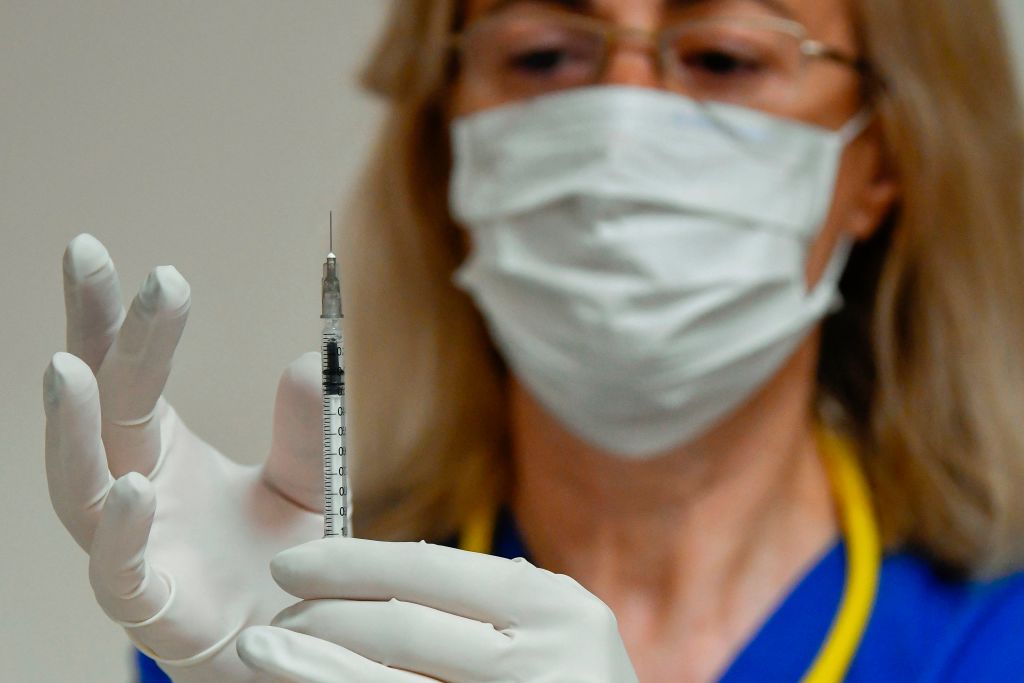AP poll: Only half of Americans say they would get COVID-19 vaccine


A free daily email with the biggest news stories of the day – and the best features from TheWeek.com
You are now subscribed
Your newsletter sign-up was successful
If the unprecedented global race for the first effective human coronavirus vaccine is successful, only 49 percent of Americans say they would get the vaccine, according to an Associated Press-NORC Center for Public Affairs Research poll released Wednesday morning. Another 31 percent said they were not sure while 20 percent said they would not get the vaccine. About 70 percent of those currently refusing the future vaccine cited safety concerns, while an equal share of those who would get a vaccine said it's the only way to get life back to normal. The top reason among people who said yes was to protect their family and community.

"There's still a large amount of uncertainty around taking the vaccine," NORC's Caitlin Oppenheimer told AP. "There is a lot of opportunity to communicate with Americans about the value and the safety of a vaccine." Dr. Francis Collins, director of the National Institutes of Health, gave it a shot. "I would not want people to think that we're cutting corners because that would be a big mistake," he told the AP earlier this month. "Definitely the worst thing that could happen is if we rush through a vaccine that turns out to have significant side effects." The NIH is drawing up plans to test successful COVID-19 vaccine candidates in tens of thousands of people to make sure they are effective and safe.
Older Americans, whites, and Democrats were more likely to say yes to the vaccine, while respondents under 60, Republicans, and black and Hispanic Americans were more likely to pass. The AP-NORC poll was conducted May 14-18 among 1,056 adults. It has a margin of sampling error of ±4.2 percentage points.
The Week
Escape your echo chamber. Get the facts behind the news, plus analysis from multiple perspectives.

Sign up for The Week's Free Newsletters
From our morning news briefing to a weekly Good News Newsletter, get the best of The Week delivered directly to your inbox.
From our morning news briefing to a weekly Good News Newsletter, get the best of The Week delivered directly to your inbox.
A free daily email with the biggest news stories of the day – and the best features from TheWeek.com
Peter has worked as a news and culture writer and editor at The Week since the site's launch in 2008. He covers politics, world affairs, religion and cultural currents. His journalism career began as a copy editor at a financial newswire and has included editorial positions at The New York Times Magazine, Facts on File, and Oregon State University.
-
 Are Hollywood ‘showmances’ losing their shine?
Are Hollywood ‘showmances’ losing their shine?In The Spotlight Teasing real-life romance between movie leads is an old Tinseltown publicity trick but modern audiences may have had enough
-
 A dreamy long weekend on the Amalfi Coast
A dreamy long weekend on the Amalfi CoastThe Week Recommends History, pasta, scenic views – this sun-drenched stretch of Italy’s southern coast has it all
-
 Can foster care overhaul stop ‘exodus’ of carers?
Can foster care overhaul stop ‘exodus’ of carers?Today’s Big Question Government announces plans to modernise ‘broken’ system and recruit more carers, but fostering remains unevenly paid and highly stressful
-
 Trump HHS slashes advised child vaccinations
Trump HHS slashes advised child vaccinationsSpeed Read In a widely condemned move, the CDC will now recommend that children get vaccinated against 11 communicable diseases, not 17
-
 FDA OKs generic abortion pill, riling the right
FDA OKs generic abortion pill, riling the rightSpeed Read The drug in question is a generic version of mifepristone, used to carry out two-thirds of US abortions
-
 RFK Jr. vaccine panel advises restricting MMRV shot
RFK Jr. vaccine panel advises restricting MMRV shotSpeed Read The committee voted to restrict access to a childhood vaccine against chickenpox
-
 Texas declares end to measles outbreak
Texas declares end to measles outbreakSpeed Read The vaccine-preventable disease is still spreading in neighboring states, Mexico and Canada
-
 RFK Jr. shuts down mRNA vaccine funding at agency
RFK Jr. shuts down mRNA vaccine funding at agencySpeed Read The decision canceled or modified 22 projects, primarily for work on vaccines and therapeutics for respiratory viruses
-
 Measles cases surge to 33-year high
Measles cases surge to 33-year highSpeed Read The infection was declared eliminated from the US in 2000 but has seen a resurgence amid vaccine hesitancy
-
 Kennedy's vaccine panel signals skepticism, change
Kennedy's vaccine panel signals skepticism, changeSpeed Read RFK Jr.'s new vaccine advisory board intends to make changes to the decades-old US immunization system
-
 Kennedy ousts entire CDC vaccine advisory panel
Kennedy ousts entire CDC vaccine advisory panelspeed read Health Secretary RFK Jr. is a longtime anti-vaccine activist who has criticized the panel of experts
